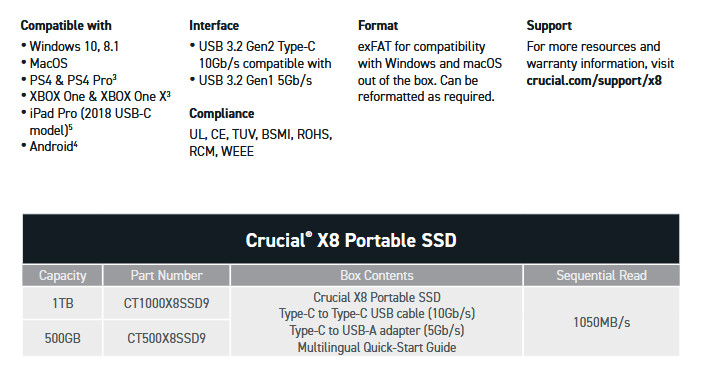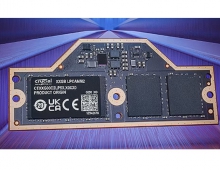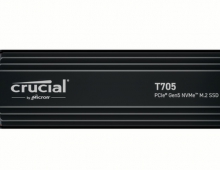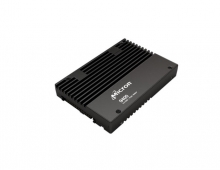
Micron Launches New Enterprise and Consumer SSDs
Micron Technology, Inc. brings the 3D XPoint technology to market with the Micron X100 SSD. The company also announced the 7300 NVMe series and Micron 5300 SATA series of SSDs, along with the Crucial X8 Portable SSD for the consumer market.
Micron X100
Micron challenges rival Intel with the new X100 SSD aimed at data centers. The X100 NVMe SSD is Micron’s first product in a new family of high-performance memory solutions based on 3D XPoint Technology.

Micron and Intel worked together starting in 2006 to bring to market the 3D XPoint technology. The technology uses three-dimensional features on storage chips to make them faster.
Micron said a year ago that it would buy out Intel’s share of the joint venture, called IM Flash Technologies, for $1.5 billion in cash and the assumption of $1 billion of Intel’s share of the venture’s debt. The deal will close this month, leaving Micron in full control of a factory built in Utah to make the chips.
Intel released a second generation of its 3D XPoint technology earlier this year. Micron is now jumping into the market, testing it with what a handful of customers.
Micron launched the X100. The device itself is a drive that can be plugged directly into a server, and Micron claims it is faster than its rival due in part to its controller.
According to Micron, the X100 offers up to 2.5 million input/output operations per second (IOPs), more than three times faster than today’s competitive SSD offerings. The SSD has more than 9GB/s bandwidth in read, write and mixed modes and is up to three times faster than today’s competitive NAND offerings.
It also provides consistent read-write latency of ≤ 8µs -- 11 times better than NAND SSDs, according to Micron. In addition, Micron claims that the X100 SSD
enables two to four times the improvements in end-user experience for various applications with prevalent data center workloads, and eliminates the need for overprovisioning storage for performance.
Since the Micron X100 SSD uses the standard NVMe interface, requires no changes to software to receive the full benefits of the product.
Micron will stat sampling the X100 SSD in limited sampling with select customers this quarter.
Micron 7300 NVMe Series SSDs

The new Micron 7300 NVMe series of SSDs are designed for workloads that demand high throughput and low latency. They are optimized for commonly used mixed read-write, compute and virtualized tasks such as SQL and NoSQL, for hyperconverged infrastructures, and for compute-centric cloud platforms. The SSD uses 96-layer 3D TLC NAND technology and offer end-to-end data path protection, power-loss protection, secure firmware and instant secure erase capability.
We need a storage device to boot the system, and if we are using storage tiering, we need another for a cache drive and more for capacity drives. The Micron 7300 can make this much simpler with M.2 form factors for boot up, U.2 MAX (mixed-use) for cache and U.2 PRO (read-intensive) for capacity tier. All from the same family, from one supplier.
- 7300 M.2: System Boot Offered in both 80mm and 120mm M.2with capacities ranging from 400 GB to 3.84 TB, the 7300 M.2 enables enterprise SSD class startup without sacrificing a data storage slot.
- 7300 MAX: Mixed-Use IO – Some of the most critical data, the data we write and modify most, is the hottest data in a platform. H
- 7300 PRO:Read-IntensiveIO – The 7300 PRO offers a capacity stretching 7.68TB per 7mm U.2 SSD to build platform and rack density.
The high-endurance 7300 MAX series offers capacities from 400GB to 6.4TB and endurance ratings of 3.0-4.2 DWPD. The 7300 PRO series uses less overprovisioning to offer capacities from 480GB to 7.68TB with endurance ratings of 1.1-1.6 DWPD.
The drives will be available for ordering starting in December 2019.

Micron 5300 SATA Series SSDs
The new Micron 5300 SATA SSDs are the industry’s first 96-layer 3D TLC enterprise SATA drives with enhanced security. The SSDs are optimized for read-intensive and mixed-use workloads while offering reliability that is 50% higher than the industry average for SATA drives.

The 5300 SATA series of SSDs are available in a range of capacities, from 240GB to 7.68TB.
The new 5300 series SATA drives are a replacement for the 5200 series that uses 64L 3D TLC.
Starting at the high end, the 5300 MAX family is the replacement for the 5200 MAX, still with a 5 DWPD endurance rating and similar performance. The 5300 MAX also adds a new 3.84TB model, but this one is only rated for 3.5 DWPD and has significantly lower random write performance.
Moving down to the PRO tier, the 5300 generation expands the capacity range to now include sizes from 240GB all the way up to 7.68TB, where the 5200 PRO only offered 960GB through 3.84TB options. The endurance ratings are a bit more consistent with the 5300 PRO series, with most models being rated for 1.5 DWPD while the 3.84TB model is rated for 1.2 DWPD and the 7.68TB model is rated for 0.6 DWPD.

Crucial X8 Portable SSD for Consumers
The Crucial X8 Portable SSD, introduced by Micron’s consumer brand for memory and storage upgrades, delivers high performance in a sleek case. With read speeds up to 1,050MB/s, the drive performs 1.8 times faster than similar portable SSDs within the same price category and up to 7.5 times faster than portable hard drives. The Crucial X8 is compatible with a variety of devices, including PCs, Macs, PS4s, XBOX Ones, iPad Pros, Chromebooks and select Android devices.
The X8 has a USB-C 10Gb/s (USB 3.1 Gen 2) connection and internally uses a NVMe SSD based on the Crucial P1 with QLC NAND flash. The Crucial X8 can handle up to ~1GB/s read speeds, the use of QLC NAND means it cannot sustain high write speeds for long.
The SSD inside the X8 is based on the same hardware as the Crucial P1. The USB to NVMe bridge chip is the ASMedia 2362.
The drive is drop-proof up to 7.5 feet.4 Crucial X8 is backed by a three-year limited warranty and available for ordering in capacities up to 1TB.


MSRPs for the X8 are higher than current prices for the P1 SSD, but are in line with MSRPs for other high-end portable SSDs: $189.99 for the 1TB and $119.99 for the 500GB model.
Silicon-Based Security-as-a-Service Platform for IoT Edge Devices
Micron also today introduced a silicon-based security-as-a-service platform for protecting internet of things (IoT) edge devices. The new Micron Authenta Key Management Service (KMS) platform enables a cloud-first deployment model for a broad set of industrial and automotive applications. It allows installed Authenta-enabled devices to be switched on through a cloud-based service, mitigating some of the biggest challenges and complexities related to securing devices in an “everything connected” environment.
The number of connected IoT devices deployed across markets such as automotive, enterprise, industrial control and connected home is expected to grow from 23 billion in 2019 to 30 billion by 2020. Securing these diverse devices remains a concern for system OEMs who want a simple solution that is cost-effective and independent of their choice of system-on-a-chip (SoC) hardware. Authenta KMS, along with its hardware root of trust embedded in NAND and NOR flash devices, equips OEMs to safeguard device functionality at the silicon level.
Micron’s Authenta KMS complements existing efforts to protect IoT networks through secure element functions in Authenta-enabled standard flash devices. Authenta KMS security-as-a-service platform allows installed secure flash devices to be activated and managed at the edge through a cloud-based service. This capability enables platform-hardening and device protection through the entire lifecycle, extending from the manufacturing supply chain to in-field installation and management.
Authenta KMS and applicable software development kits are available to today.





















